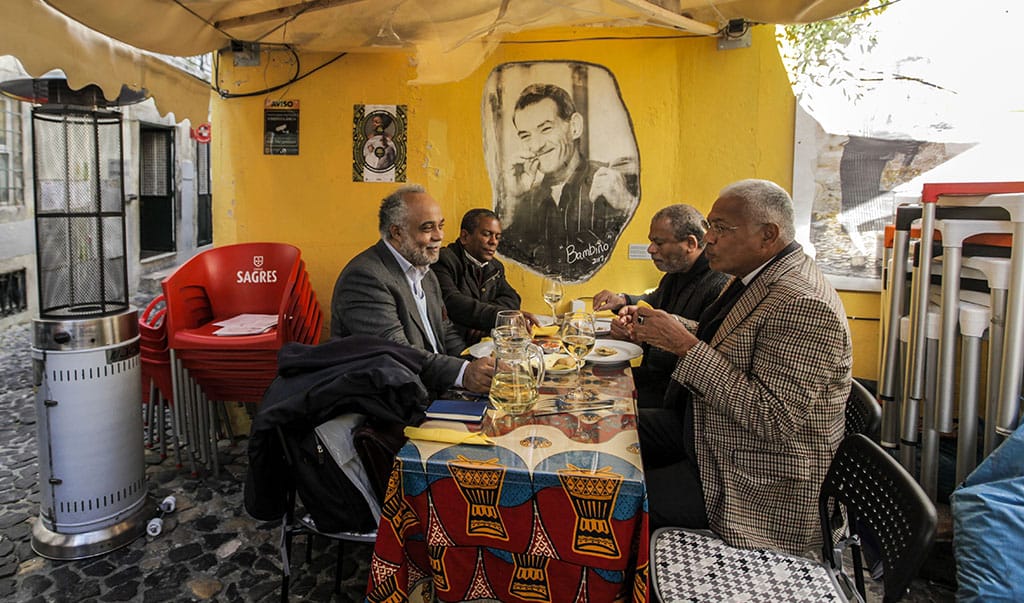The Mozambican community in Lisbon may be small, but the city is blessed with several delightful restaurants serving the food of their home country – one of them even a neighborhood landmark.
Cantinho do Aziz: The Pioneer
Despite the relative discretion of the community in the Portuguese capital, one of Lisbon’s most well-known restaurants is actually Mozambican. Cantinho do Aziz opened 33 years ago along a narrow path in Mouraria. Since then, everything around it has changed, including the customers – but its kitchen has pretty much stayed the same.
 Mr. Aziz, the founder, moved from the north of Mozambique to Lisbon at the beginning of the 1980s and found work as a waiter at this same spot, which was at that time a low-key restaurant managed by a French couple. When they left, Aziz took over, turning it into what was likely the first Mozambican food house in the city. After his wife and three children reached him, it became a family business.
Mr. Aziz, the founder, moved from the north of Mozambique to Lisbon at the beginning of the 1980s and found work as a waiter at this same spot, which was at that time a low-key restaurant managed by a French couple. When they left, Aziz took over, turning it into what was likely the first Mozambican food house in the city. After his wife and three children reached him, it became a family business.
“He was an icon in the neighborhood, due to his congeniality, hospitality and cooking skills,” says his daughter Chena, now managing the restaurant. The outdoor terrace, which takes over the adjacent alley, is decorated with old photographs of the family – just one indication of how Cantinho do Aziz grew over time into a local legend. Family members are now continuing the legacy with a new restaurant in the slightly less sunny city of Leeds, in the U.K.
Chena describes their cuisine as Indo-African, with sauces and curries similar to south India but with less spice – the fragrant basis of their dishes combines coriander, cumin, saffron, coconut and peanut. The menu is rich with curry dishes, with each sauce prepared early in the morning and the basmati rice, the usual accompaniment, boiled in coconut water – but a homemade, non-fad version. The water is prepared by grating coconut into very hot water, which is later squeezed and filtered. A similar process is used for making peanut milk. “We don’t use preservatives, everything is made from scratch with love and experience,” says Chena. “That’s why customers always come back; including the comeon [Lisbon slang for tourists/foreigners] who sometimes eat here every day until they leave.”
 Crab curry is one of the star dishes, as well as lamb chacuti – an ancient dish of pre-Portuguese Goan cuisine, spiced with ingredients from the west Indian Konkan coast such as poppy seeds, coconut, large dried red chile and tamarind. These two delicious plates, like many others at Cantinho de Aziz, have a strong Goan influence – converted Catholic Goans were encouraged by the colonial authorities to migrate to Mozambique during the 19th century.
Crab curry is one of the star dishes, as well as lamb chacuti – an ancient dish of pre-Portuguese Goan cuisine, spiced with ingredients from the west Indian Konkan coast such as poppy seeds, coconut, large dried red chile and tamarind. These two delicious plates, like many others at Cantinho de Aziz, have a strong Goan influence – converted Catholic Goans were encouraged by the colonial authorities to migrate to Mozambique during the 19th century.
But despite the South Asian influence, almost all the ingredients used in the Aziz kitchen come from Mozambique. The Malagueta chile pepper is used in their unique piri-piri sauce called sacana (literally translated as “bastard”); we recommend a cold bottle of Mozambican beer to counteract the heat.
Roda Viva: South Central Mozambique Meets Lisbon
Cantinho do Aziz is not the only great Mozambican restaurant in Lisbon. Located in another small alleyway, this time in Alfama, Roda Viva is an excellent option, particularly for vegetarians. It’s the project of Octavio Chamba, a Mozambican chef and anthropologist with a passion for percussion who moved to Lisbon 10 years ago to study ethnomusicology.
 He unexpectedly ended up with this cute and tiny eatery in the capital’s oldest district and decided to devise a menu according to his home region of south central Mozambique – the classic ingredients being coconut, peanut, yucca and corn. Dishes such as makofo (cabbage), nhangana (nhemba bean leaves with coconut and peanut) and the prawn-based matapah are hard to find elsewhere in the city.
He unexpectedly ended up with this cute and tiny eatery in the capital’s oldest district and decided to devise a menu according to his home region of south central Mozambique – the classic ingredients being coconut, peanut, yucca and corn. Dishes such as makofo (cabbage), nhangana (nhemba bean leaves with coconut and peanut) and the prawn-based matapah are hard to find elsewhere in the city.
Though shipping containers loaded with Mozambican products habitually arrive to Portuguese ports, there are several limitations to any Mozambican restaurant menu, as many recipes contain vegetables and leaves banned by European regulations. In spite of that, downing some Laurentina (Mozambique’s best beer) with Octavio and listening to his stories of the rich Mozambican cultural history is as enjoyable as the food itself.
Published on August 25, 2017
Related stories
January 8, 2017
LisbonQuick Bite: On this afternoon food tour in Lisbon, we’ll explore the old and the new in the kitchens of Mouraria and Graça, which are home to historic and scenic backstreets. In Lisbon’s historic neighborhoods of Mouraria and Graça, where scenic little streets spread out, web-like, in the shadows of St. George Castle, the smell…
March 29, 2016
LisbonIt’s a buzzing Thursday night at Associação Renovar a Mouraria (ARM), a one-room bar and eatery found in a nook at the top of some ancient stone steps leading up from Rua da Madalena. Dani, a local tattooist born in Java, is cooking for around 35 people as part of the weekly Jantar Atravessado (“dinner…
June 27, 2022
LisbonEditor’s Note: Though integral elements of Lisbon life, communities from Portugal’s former colonies can sometimes be an invisible presence in their adopted land, pushed out to the periphery. With our “Postcolonial Lisbon” series, CB hopes to bring these communities back into the center, looking at their cuisine, history and cultural life. In this installment, we…



















































































